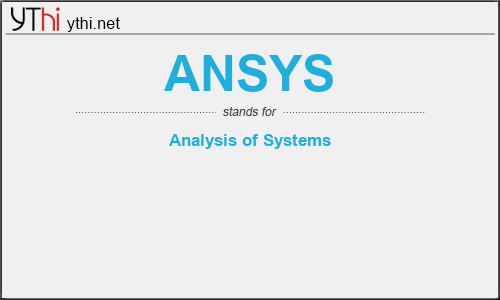What does ANSYS mean? What is the full form of ANSYS?
The Full Form of ANSYS is Analysis of Systems.
Systems analysis is the process by which an individual (s) studies a system such that an information system can be analyzed, modeled, and a logical alternative can be chosen. Systems analysis projects are initiated for three reasons: problems, opportunities, and directives. The people involved include systems analysts, sponsors, and users. The process by which systems are developed can be described by the systems development life cycle. The tasks, techniques, and tools used by the systems development life cycle can be referred as a methodology. There are three classifications of the methodologies: traditional, information engineering, and object-oriented. CASE tools are automated tools that support specific methodologies.
Systems, Analysis, and Synthesis describes the scope of the book and explains the difference between analysis and synthesis. It treats systems analysis as a process in which the analyst is challenged to reverse-engineer someone else’s, possibly dysfunctional, synthesis. It is more important to ask, ‘What?’ and ‘Why?’ rather than ‘How?’
Rather than design a system by guesswork, the reader is encouraged to solve problems at an abstract or conceptual level and derive a design that is guaranteed to be correct. Although an experienced designer can often find a valid design intuitively, experience may be the one thing the reader lacks.
The chapter contrasts compositional and decompositional approaches, suggesting that composing a system from parts can be simpler than decomposing a completed system.
It introduces the question of tractability, a thread that will run through the book. The book avoids, as far as possible, suggesting that the reader should solve intractable problems.
ANSYS
means
Analysis of Systems![]()
Translate Analysis of Systems to other language.


Leave a Reply
You must be logged in to post a comment.